
Football players in Cameroon’s women’s league during a team training session in Yaoundé, January 2023.
More than a little worn out after a training session on this January morning, Tracy Kongnyuymo is already hard at work in a hairdressing salon in Yaoundé, the Cameroonian capital, where she lives. Though exhausted, the 16-year-old footballer is hoping to pick up a few customers before heading to a second training session with her club, Canon Football Filles, a team in the women’s first division. She is not a salaried employee in this family business but the 3,000 CFA francs (about €4.57 or US$4.80) a day she earns working her side job cover transport costs to her training sessions.
“The money also contributes to my daily food intake and for recuperation when I finish training, because sometimes the club accumulates arrears of training allowances (1,000 CFA francs, the equivalent of €1.52 or US$1.60),” says Kongnyuymo, who previously played for Bui Dynamic de Kumbo, a team in the north-west of the country, which she was forced to leave two years ago due to political instability. She faces the dual challenge of earning income in hairdressing to partially support herself while continuing to pursue her dream of a professional career.
For Richard Nkaké, that dream faded in 2016 when the former goalkeeper for Cosmos de Bafia decided to turn his back on his passion after a difficult season with the club. “Their failure to pay my signing bonus, which was one million CFA francs (about €1,520 or US$1,600) for one season, and six months of salary arrears contributed to the breakdown of our contractual relationship,” confides the former footballer, now a police commissioner.
Salary arrears, phantom contracts and lack of social security
Professional players, both men and women, face similar problems throughout Cameroon. The appalling professional conditions under which they play include a litany of contractual failures on the part of their employing clubs: accumulation of salary arrears, almost non-existent social protection, meagre bonuses, ghost contracts, etc.
To the outside world, Cameroon is known as one of Africa’s greatest football powers, having won five continental championship titles and participated in the World Cup more than any other African nation (eight times). The polished image projected by its national team contrasts with the appalling conditions that local footballers face. The clubs employing them act with impunity while the state and the Cameroon Football Federation react with cosmetic solutions that do nothing to improve the situation.
The National Union of Cameroonian Footballers, an affiliate of the International Federation of Professional Footballers (FIFPRO), the largest representative organisation defending the interests of footballers worldwide, published the results of a survey on the living and working conditions of Cameroonian footballers in 2021.
The survey revealed that only 40 per cent of players in Cameroon’s first division possess a copy of their contract. That figure drops to 13 per cent for players in the second division and only 5 per cent for players in the women’s first division.
The most glaring abuse is clubs’ failure to pay salaries, which has repeatedly led players to go on strike. SYNAFOC recorded 101 complaints from Cameroonian footballers related to salary claims in 2022, 90 of whom played in the domestic league. The union estimates the financial damage inflicted on players by clubs in that year at nearly 60 million CFA francs (about €91,470 or US$96,000).
According to Eric Menye, SYNAFOC’s director of operations: “Players complain about having signed contracts and not having a copy of the contract; they complain about the non-payment of their signing bonus and the refusal of their clubs to release players; they tell us that they have not been paid since they signed. This is due in large part to certain players’ ignorance of their rights”.
Very few footballers benefit from social security through their clubs. In 2014, three years after the professionalisation of Cameroonian football, Cameroon’s National Social Security Fund (CNPS) reported that only six professional teams had registered for its services and that no footballers, coaches or referees had been registered in the meantime. According to SYNAFOC’s 2021 survey, only 3 per cent of players in the first and second divisions are registered with the CNPS through their clubs, while barely 2 per cent of female footballers in the first division are registered.
Most Cameroonian footballers have not had a lot of formal education and have no real knowledge of the legal framework governing their profession.
Pulchérie Jovanie Assene is an exception. The 27-year-old footballer plays for AS Awa Football Filles in the women’s first division and is studying for a doctorate in sports law at the University of Ngaoundéré in the north of the country. The precarious playing conditions that women footballers playing in Cameroon face inspired her to conduct a survey during the 2021-2022 season as part of her research work.
“An analysis of the questionnaires submitted to the players reveals that 75 per cent have children to support, 15 per cent rely only on themselves, and only 10 per cent live under suitable conditions with the support of their families. Some 45 per cent have incomes outside of what they earn playing football,” says Assene.
The footballer and doctoral student also reveals that the vast majority of female players who have other jobs in addition to football are involved in small-scale trade or are employed part-time in sports betting companies – if not serving customers in bars or hairdressing salons, as Tracy Kongnyuymo does.
Improving the working conditions of professional football players around the world is an important concern for the International Labour Organization (ILO). In January, the ILO supported discussions between FIFPRO and the World Leagues Forum (WLF) on decent work in the professional football sector, following the Global Labour Agreement signed by the two bodies in September 2022.
Multiple sources of subsidies finance players’ salaries
While the failure to meet obligations to players is in violation of national social protection legislation, the practice is commonplace as clubs struggle to find independent sources of funding while relying heavily on subsidies.
Since 2011, the Cameroonian state has regularly injected 960 million CFA francs (€1.46 million or US$1.5 million) each season to subsidise professional football, 560 million CFA francs of which is given to the clubs in order to pay the salaries of players in the Elite One and Elite Two leagues.
The federation also grants subsidies to clubs to pay the salaries of players in its two flagship divisions. For the 2022-2023 season, it decided to subsidise each first division club to the tune of 48 million CFA francs and has required clubs to re-evaluate their salary scales, with a minimum salary of 200,000 CFA francs (about €305 or US$325) per footballer.
“The problem of players’ salaries has not yet been definitively resolved. It’s a problem that needs to be discussed between the clubs, the players, the federation, the SYNAFOC, and even the CNPS,” explains Jean-Jacques Mouandjo, head of the marketing and communication department at FECAFOOT.
“This implies that the clubs agree with the payment of 200,000 CFA francs, but this amount includes training bonuses for certain clubs and not for others. We are working to harmonise this and a discussion between the various professional bodies is currently taking place”.
Local companies are also chipping in to help female players. One brewing company is the main sponsor of the women’s top tier. Last season, it regularly disbursed 15 million CFA francs (€22,870 or US$25,000) every month to pay 50 per cent of players’ salaries.
The other half was paid by the federation to ensure that players earn 100,000 CFA francs (about €152 or US$162). But this season, the football body cancelled its contribution because of uncertainties about the profitability of its partnership with the brewing company, whose assets are currently being absorbed by another company, also a partner of FECAFOOT.
Where clubs stand after a decade of professional football in Cameroon
Of the 37 professional football clubs competing in Cameroon during the 2022-2023 season, only one, Coton Sport Garoua, a club based in the north of the country, can claim to be on the road to professionalism. Owned by the mutual insurance company of the SODECOTON (Société de Développement du Coton) agents, it is the best structured team in the country and its business model is based on financial contributions from its members as well as on player transfers.
The club AS Fortuna, a modest one-man operation owned by a private investor who is also the majority shareholder, derives 70 per cent of its financial resources from the transfer fees of former players trained at the club.
The team recently pocketed 56 million CFA francs (€85,300 or US$92,000) on the transfer of André Franck Zambo Anguissa, a former member who transferred from English club Fulham to SCC Napoli. This transaction alone represents 28.4 per cent of the club’s overall budget for the current season, which is set at 197 million CFA francs.
“This budget is provisional. It does not include stadium revenues which are non-existent. The federation provides about 50 million CFA francs, but as of now [January 2023], we have only received 11.4 million CFA francs since the beginning of the season, while Fortuna’s wage bill alone amounts to 8.5 million per month,” says Roger Noah, president of AS Fortuna.
Noah considers the federation’s financial support to be insignificant and calls for the state of Cameroon to take complete control of football in the country. “We can’t do anything without the moral and financial guarantee of the state. If it wants professional football, it must establish a policy of support and make significant resources available, as is the case everywhere else”.
Football is Cameroon’s most beloved sport. It has changed the social status of many families thanks to the emergence of talented players, most of whom have immigrated to Europe. Disheartened by the poor state of local football, many local players dream of making a similar move. The hopes that were raised by the arrival of Cameroonian football legend Samuel Eto’o Fils at the head of the Cameroon Football Federation in December 2021 quickly fade with each passing month.












